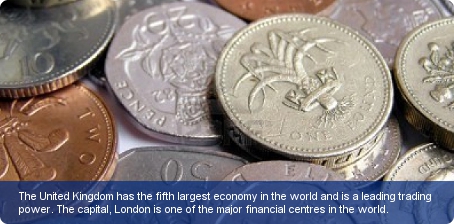Find a business in United Kingdom

The United Kingdom is a leading trading power and London is one of the major financial centres in the world. During the past thirty years successive governments have greatly reduced public ownership by transferring ownership of state enterprises into the private sector. The UK has a GNI per capita of US$38,370 but has seen slow growth of 0.3% per annum (2006-10). Its dominant industries are financial and professional services and the services sector as a whole contributes 77% of GDP (2010).
While industry continues to decline in importance, services, particularly banking, insurance and business services continue to grow and account by far for the largest proportion of GDP. The UK is a leading trading power and financial centre. The country has world class financial expertise and skills, a transparent regulatory environment and broad financial infrastructure with access to international capital. The sector includes financial services companies involved in commercial banking, investment and merchant banking, insurance, offshore services, investment funds, pension funds and numerous other financial intermediary functions. All the world’s major banks – international or of UK origin – operate in the country.
The manufacturing sector contributes 13.5% of the UK’s GDP. In a globalised economy, major challenges currently come from emerging economies which are able to produce goods more cheaply than the UK and in an economy where services contribute over three-quarters of GDP manufacturing is no longer the central part of the UK economy.
The UK has large coal, natural gas and oil reserves and the country’s primary energy production accounts for 10% of GDP. There are 2.858 billion barrels of proven oil reserves and 256 billion cubic metres of proven natural gas reserves (January, 2011). The UK is consistently a net exporter of both oil and gas, and has benefited immensely since the 1960s from North Sea reserves raking in revenues of more than US$1 trillion. UK companies are world leaders in many areas of prospecting, developing, exploring and extracting oil and gas internationally.
UK agriculture is intensive, highly mechanized and very efficient by EU standards, producing about 60% of the country’s food requirements using less than 2% of the labour force. But agriculture contributes only 1% of GDP (2010).
All of the roads in the UK are paved and at least 70% of households own one car (2010). There are underground railway systems in London and Glasgow as well as the Channel Tunnel between Folkestone in England and Calais in France. Major international airports include Heathrow, Gatwick, Stansted and City Airport.
Despite its high-level of economic development the UK is extremely vulnerable to global economic contagion, particularly through its dominant financial sector. The global economic downturn of 2008-09 hit the economy hard with real growth in GDP of minus 4.9% in 2009. The turmoil in financial markets affected the UK more than most because of the dominance of the City of London and financial services industry in the national economy. In 2010, when a new government launched its five-year programme of public spending cuts aimed at eliminating the budget deficit, the economy grew by 1.4% and in 2011 by about 0.9%.
The United Kingdom is ranked 7th in the world for ease of doing business, according to the World Bank’s ‘Doing Business 2012’ study of 183 countries. It tops the rankings for getting credit and is sixth for resolving insolvency. These rankings measure the conduciveness of a regulatory regime in starting and operating a business.
The UK has an adult literacy rate of 99% and is an English-speaking country. Various other languages, mainly European and Asian, are spoken. The services sectors employ the most people. Around 28% of the workforce are professionals and senior managers and the UK recruitment and human resources sector is worth billions in revenues.



